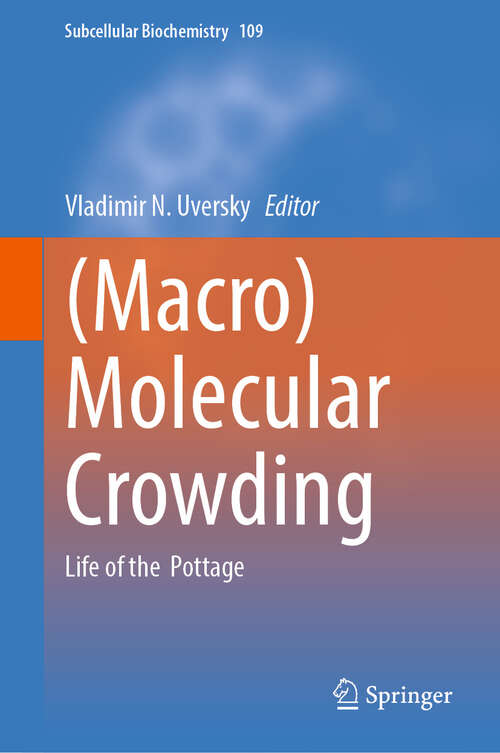
**Missing**: Life of the Pottage (Subcellular Biochemistry #109)
Science and technology
Synthetic audio, Automated braille
Summary
This book offers a general overview of an important biological phenomenon known as macromolecular crowding. This phenomenon is rooted in the fact that the living cell contains very large quantities of various biological macromolecules, such as proteins, nucleic acids, and… carbohydrates, whose concentration can be as high as 400 mg/ml, and which occupy about 30% of the cell volume. Such a crowded environment represents a type of cellular pottage with considerably restricted amounts of free water and has several specific characteristics, such as changing viscosity, water activity, and famous volume exclusion originating from the simple idea that the volume occupied by the cellular macromolecules is unavailable to other molecules. All this may have large effects on both stability of biological macromolecules and macromolecular equilibria, including protein–protein interactions, protein folding, protein aggregation, and macromolecular association, as well as may lead to significant alterations in the rates of chemical reactions. However, the effect of such a complex crowded environment on the behavior of biological macromolecules is poorly understood. This is because most of the biomolecular research in vitro is traditionally conducted in dilute solutions, which by no means can be considered adequate models of the extremely crowded intracellular space. To overcome these issues, multiple approaches are being developed to mimic macromolecular environments and to investigate biomolecules under these conditions of artificial crowding and confinement. Importantly, recent years revealed that the distribution of macromolecules within the intracellular space is highly inhomogeneous; i.e., macromolecular crowding is characterized by the remarkable spatio-temporal heterogeneity, where one can find various membrane-less organelles and biological condensates representing overcrowded liquid droplets. The biogenesis of these highly dynamic cellular entities is driven by the liquid-liquid phase separation, and their formation typically represents a cellular response to the changing environment. These observations opened multiple new directions for a better understanding of the complexity and peculiarities of the cellular molecular kitchen. This book aims at providing foundational information on these and related topics, which will be delivered by world-leading specialists in corresponding fields. By having chapters spread across all key foundational elements that come together in this field of study, this book will be the go-to reference in the area. It will provide guided access to the appropriate primary and secondary literature of this very exciting field. It also will provide a description of the physics of the process, give experimental guidance regarding the characterization of these phenomena, and show examples of well-understood systems. The book will provide a guide that will allow readers to rapidly form hypotheses and design experiments on their proteins or study system.